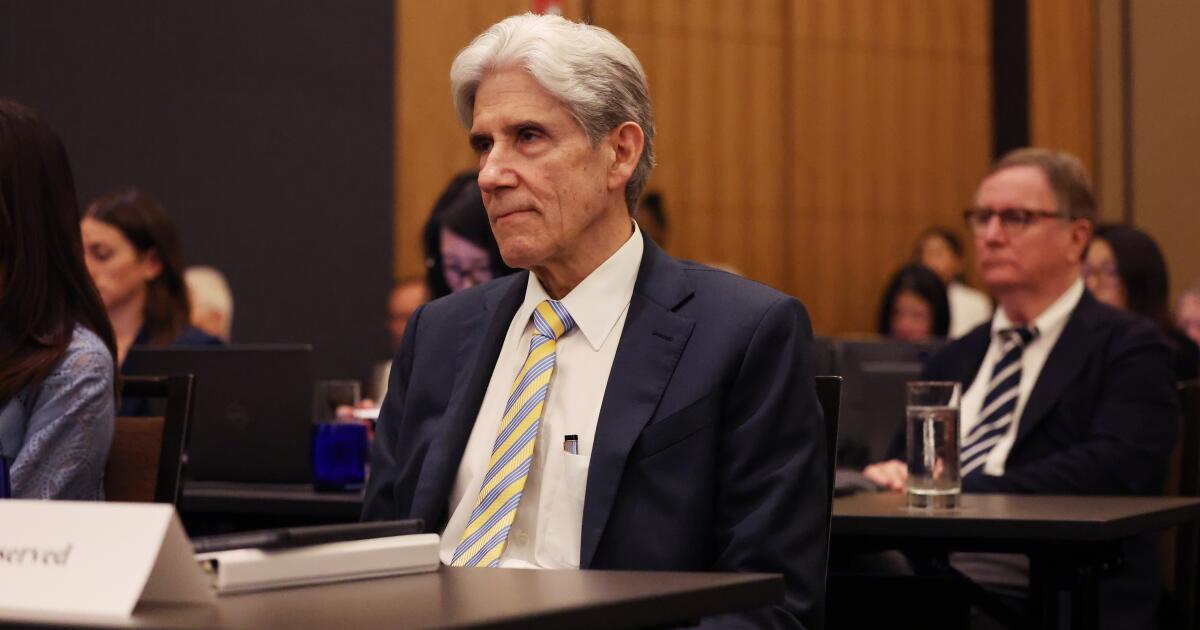The California State Bar has filed disciplinary charges against Aaron Spolin, a West Los Angeles attorney who won hundreds of inmates as clients by convincing their desperate families that he could free them.
In a filing Monday, the Bar accused Spolin of 18 violations of the state’s rules of professional conduct for attorneys and business code, including moral turpitude and charging abusive fees. If convicted, he could face penalties ranging from probation to disbarment by the state Supreme Court.
“Offering false hope to those in dire straits for personal financial gain is contrary to the responsibilities of a lawyer,” lead trial attorney George Cardona, the bar's lead prosecutor, said in a statement responding to the charges.
Spolin, a 39-year-old Princeton-educated former McKinsey consultant, seized on the 2019 passage of landmark criminal justice reform laws to market himself to the incarcerated. In mass mailings to prisons, he told inmates serving decades behind bars that they might be eligible “for sentence reduction under several new laws.” He included online search terms so that loved ones searching for the reforms on Google would be directed to his website. In subsequent phone calls, he offered a rosy picture of inmates’ chances for freedom.
Over time, he amassed nearly 2,000 incarcerated clients and became a virtual celebrity in California prison yards. Families, many of them with limited resources, shelled out fees ranging from $3,000 to $30,000.
But, as The Times revealed last year, Spolin’s claims of success were false or exaggerated, and many of the legal strategies he urged families to pursue had no chance of success. The work his firm did was underwhelming and standardised. It relied on low-paid contract lawyers with little or no experience in criminal appeals, including some in the Philippines and other developing countries who earned around $10 an hour.
Spolin's attorney, Erin Joyce, said in a statement: “Mr. Spolin has cooperated fully with the State Bar and will continue to do so. He looks forward to resolving this matter in the near future.”
Interviewed last year, Spolin acknowledged giving some clients overly optimistic assessments of their chances for freedom, but predicted the justice system would eventually change its mind and embrace broader reforms.
“All those clients who feel they've been cheated and are going to win are going to say, 'Wow, Mr. Spolin was right,'” he said.
Ellen J. Eggers, a retired state public defender who works to free wrongfully convicted inmates, was one of several criminal defense attorneys who raised concerns about Spolin with the bar association.
“He puts pressure on people and tries to give them hope when there isn’t any and he knows there isn’t any,” Eggers said. She said the violations filed by the Bar “are really just the tip of the iceberg.”
Those allegations relate to four clients — three men from Los Angeles and one from Orange County — whom he represented from 2021 to 2023. Spolin told the men, who were serving sentences for murder, kidnapping and other felonies, that they had a good chance of being released under a law that allowed county district attorneys to recommend inmates for release. In reality, they did not meet the guidelines for consideration, and district attorney offices in Los Angeles and Orange County had sent Spolin numerous letters informing him of their policies.
Bar prosecutor Gail Mullikin wrote in the filing that Spolin “intentionally and dishonestly sought and obtained legal fees … without regard to whether the legal services he marketed to those individuals would be of any significant benefit.”
One client identified by the bar association, Karl Holmes, has been on death row for three murders in Los Angeles since 1997. Spolin charged Holmes’ fiancée $3,000 for a 2022 review of the case in which he “strongly recommended” she seek Holmes’ release through the district attorney’s office, for an additional fee.
“The case review did not inform Holmes or [his fiance] that based on Holmes' serious and violent felony convictions, Holmes fell outside the 'priority criteria' applied by the LADA to determine which cases, if any, it would consider for resentencing,” the bar association argued.
The family of another client, Thomas Stringer, who is serving a sentence of 160 years to life for kidnapping and other crimes, paid Spolin $14,700 in 2022. After Stringer’s sister checked the Los Angeles District Attorney’s website last year and learned the selection criteria, she confronted Spolin. He continued to insist that Stinger had a chance.
“We have been in contact with the District Attorney’s Office and they have stated that they would like more information about you and your case,” Spolin wrote to Stringer. No member of the District Attorney’s Office had made such a request, according to the bar association’s filing.
In the case of another client, John Poe, who was serving a 64-years-to-life sentence for murder, the Los Angeles district attorney's office reprimanded Spolin for wasting its time and resources.
“Please be advised that contacting our office to provide unsolicited information about a particular individual or to request an update is not helpful and, in fact, seriously detracts from our ability to review these cases in a fair, orderly and expeditious manner,” the office told the court in 2022.
Spolin did not tell Poe or his sister, who had paid $26,700 in fees, about the response.
Holmes' fiancée, Vanessa Holley, said she was pleased with the bar's action. She recalled how happy she initially felt when Spolin told her of a clear path to bring her husband home.
“It gave me hope, and that was what I needed,” Holley said. “But after a while, I started noticing how insistent they were about money. And I thought, ‘Why, if they have such a good success rate, do they focus so much on that?’”












